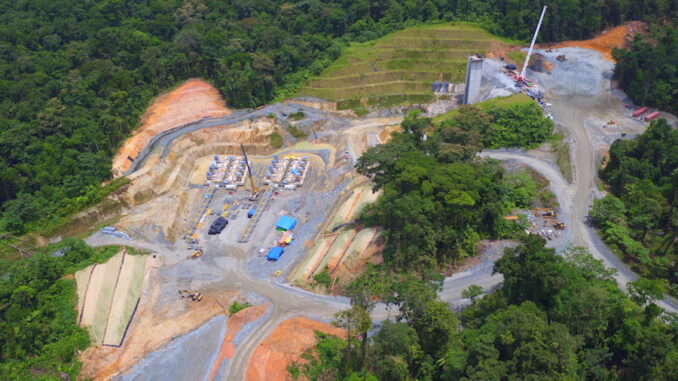
The miner said on Friday it was doing everything possible to support its operations in Panama, “including through all available legal means.” It also expressed disappointment at what it considers “unnecessary actions” by the government.
According to Ebrahim Asvat, lawyer and part of Panama’s negotiating team, the mine closure is not immediate.
“What the national government decided was to order each ministry to take the necessary steps to maintain the copper mine with adequate care and maintenance,” he told Eco TV.
An agreement was reached in January, with the company committing to up its royalty payments for the mine. It also agreed to give Panama between 12% and 16% of its gross profit, which would replace the previous 2% revenue royalty.
First Quantum agreed as well to start paying 25% corporation tax, from which it was previously exempted, until its investments at the mine were recovered.
Sealing the deal dragged on for months, until President Laurentino Cortizo’s administration set a Wednesday night deadline for First Quantum to ink the new contract.
The miner then sent a new proposal that “fundamentally” changed the deal’s economics, the Ministry of Commerce and Industries said on Thursday morning.
The point of contention seems to be a clause that would make the Vancouver-based miner pay a minimum of $375 million in royalties to the state.
According to Bloomberg, First Quantum had been pushing for an exception in the case of much lower metal prices and profit.
“We expected reciprocity”
During a live television address to the nation on Thursday night, Cortizo said his government had put “all the necessary patience, good faith and the best of wills to get the mining company to ratify what was agreed, and that is why we expected reciprocity from the company, which did not happen.”
“This is not acceptable for me as president, nor for the government, nor for the people of Panama,” Cortizo said in the televised speech.
The President also said his administration will seek the best options to ensure the sustained operation of the mine, noting he had ordered the environment minister to oversee the site and the labour ministry to guarantee the jobs of workers.
He concluded by noting that the action taken sought to guarantee the principle established in the country’s Constitution, stating that Panama’s mineral resources belong to the Panamanian people.
The nation is reportedly working with a financial advisor to identify new potential partners for Cobre Panama, which raises concerns about the country nationalizing the asset or removing First Quantum’s license to operate, experts at BMO say.
Cobre Panama is the biggest foreign investment in the Central American nation, supporting 40,000 jobs. (Image courtesy of Minera Panama.)
“Our base-case expectation is that the government’s position is part of a broader negotiation; however, the recent escalation does raise uncertainty about First Quantum’s ability to operate in the country long term, and the risk that investors will see in Panama going forward,” BMO Metals and Mining analyst, Jackie Przybylowski, wrote.
From a copper market perspective, any sustained outage at the mine would further tighten global supplies, contributing to an expected annual deficit of 4.7 million tonnes by 2030.
“We have significant plans for the future of Cobre Panamá that will benefit all Panamanians, and our goal remains to find a ‘win-win’ resolution with the government,” the miner said on Friday.
First Quatum’s Cobre Panama achieved commercial production in September 2019. The asset is estimated to hold 3.1 billion tonnes in proven and probable reserves and at full capacity can produce more than 300,000 tonnes of copper per year, or about 1.5% of global production of the metal.
The company says it has invested around $10 billion in Cobre Panama, the largest private investment ever in the country, and was contemplating expanding the processing capacity of the mine from 85 million tonnes per year to 100 million tpy in 2023. This would have allowed it to boost production to nearly 360,000 tonnes of copper by the end of this year and to 350,000-380,000 tonnes in 2023.
First Quantum is one of the world’s top copper miners and Canada’s largest producer of the metal. It produced 816,000 tonnes of copper in 2021, its highest ever, thanks mainly to record output at Cobre Panama.
Cobre Panama. (Image courtesy of First Quantum.)
The company is expected to reach its 2022 target of between 790,000 and 855,000 tonnes of copper by year-end.
The Cobre Panama mine complex, located about 120 km west of Panama City and 20 km from the Atlantic coast, contributes 3.5% of the Central American country’s gross domestic product, according to government figures.
The miner first ran into trouble in 2018 when Panama’s Supreme Court, acting on a suit filed by environmental groups, ruled the mining code at the time of allowing the operation was unconstitutional. This forced the parties to begin renegotiating the contract.
Fairly uncommon move
Panama’s decision is a major blow to chief executive Tristan Pascall, who succeeded his father, Phillip, in May.
Latin America is the jurisdiction where risks of asset seizures and taxes hikes have increased the most in the past two years, risk consultancy Verisk Maplecroft estimates.
The practice, however, has been rare in Latin America’s recent past. One of the last major expropriations was in 2012, when then-Argentina President Cristina Fernandez de Kirchner’s government seized a 51% stake in the country’s largest oil and gas producer, YPF SA, from Repsol SA.
Almost ten years later, in April 2022, Mexican President Andres Manuel Lopez Obrador declared lithium a “strategic mineral” whose exploration, exploitation, and use are the exclusive right of the country, through a new state-run company called Litio para Mexico, or Lithium for Mexico.
